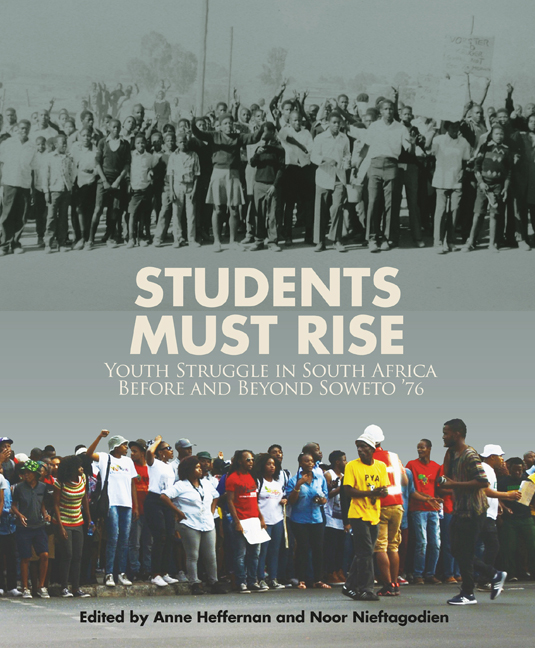Book contents
- Frontmatter
- Acknowledgements
- Contents
- Timeline
- Map Of South Africa
- Glossary
- Abbreviations
- Introduction: narratives of the student struggle
- Chapter 1 A brief history of the African Students’ Association
- Chapter 2 Youth and student culture: Riding resistance and imagining the future
- Chapter 3 The role of religion and theology in the organisation of student activists
- Chapter 4 Student organisation in Lehurutshe and the impact of Onkgopotse Abram Tiro
- Chapter 5 The University of the North: A regional and national centre of activism
- Chapter 6 Action and fire in Soweto, June 1976
- Chapter 7 What they shot in Alex
- Chapter 8 SASO and Black Consciousness, and the shift to congress politics
- Chapter 9 Youth politics and rural rebellion in Zebediela and other parts of the “homeland” of Lebowa, 1976–1977
- Chapter 10 My Journey, our journey: Activism at Ongoye University
- Chapter 11 ‘Let's begin to participate fully now in politics’: Student politics, Mhluzi township, 1970s
- Chapter 12 ‘They would remind you of 1960’: The emergence of radical student politics in the Vaal Triangle, 1972–1985
- Chapter 13 The ends of boycott
- Chapter 14 Fighting for ‘our little freedoms’: The evolution of student and youth politics in Phomolong township, Free State
- Chapter 15 ‘Every generation has its struggle’: A brief history of Equal Education, 2008–15
- Chapter 16 Contemporary student politics in South Africa: The rise of the black-led student movements of #RhodesMustFall and #FeesMustFall in 2015
- Selected Bibliography
Chapter 5 - The University of the North: A regional and national centre of activism
Published online by Cambridge University Press: 21 April 2018
- Frontmatter
- Acknowledgements
- Contents
- Timeline
- Map Of South Africa
- Glossary
- Abbreviations
- Introduction: narratives of the student struggle
- Chapter 1 A brief history of the African Students’ Association
- Chapter 2 Youth and student culture: Riding resistance and imagining the future
- Chapter 3 The role of religion and theology in the organisation of student activists
- Chapter 4 Student organisation in Lehurutshe and the impact of Onkgopotse Abram Tiro
- Chapter 5 The University of the North: A regional and national centre of activism
- Chapter 6 Action and fire in Soweto, June 1976
- Chapter 7 What they shot in Alex
- Chapter 8 SASO and Black Consciousness, and the shift to congress politics
- Chapter 9 Youth politics and rural rebellion in Zebediela and other parts of the “homeland” of Lebowa, 1976–1977
- Chapter 10 My Journey, our journey: Activism at Ongoye University
- Chapter 11 ‘Let's begin to participate fully now in politics’: Student politics, Mhluzi township, 1970s
- Chapter 12 ‘They would remind you of 1960’: The emergence of radical student politics in the Vaal Triangle, 1972–1985
- Chapter 13 The ends of boycott
- Chapter 14 Fighting for ‘our little freedoms’: The evolution of student and youth politics in Phomolong township, Free State
- Chapter 15 ‘Every generation has its struggle’: A brief history of Equal Education, 2008–15
- Chapter 16 Contemporary student politics in South Africa: The rise of the black-led student movements of #RhodesMustFall and #FeesMustFall in 2015
- Selected Bibliography
Summary
The Extension of University Education Act of 1959 created a system of universities and colleges across South Africa that were segregated not just by race, but by ethnic group. One of these, the University College of the North, was responsible for educating students of Sotho, Tswana, Venda, and Tsonga backgrounds who, it was imagined, would become the civil servants, doctors, engineers and other professionals who would populate the surrounding “homelands” of Venda, Lebowa, Gazankulu, and Bophuthatswana. Instead, “Turfloop”, as the University College of the North was known, became a centre for anti-apartheid political activism for students and young people around the region of the northern Transvaal (now Limpopo) and beyond.
Like other so-called “bush colleges” Turfloop was geographically isolated, but strategically located near several of the homelands in South Africa's rural north. From 1972 it fell technically within the borders of Lebowa, but continued to be administered by the Department of Bantu Education of South Africa, and to educate students from other homelands and from urban townships. In its early years this division was approximately half-and-half, with slightly more students coming from surrounding rural areas. Over the 1960s, as the population of Turfloop grew significantly (in 1960, its first class consisted of only 87 students; by the end of the decade, in 1969, it had 630) the balance shifted and urban students outnumbered rural ones.
This chapter explores the years in the late 1960s and early 1970s, when the university became a national centre for activism through the influence of the South African Students’ Organisation (SASO) and key student activists. It argues that, due to early permissiveness on the part of university authorities and to the peculiar character of life in an “apartheid university” Turfloop was especially fertile ground for political mobilisation. It suggests that SASO's close relationship to student governance at the university, and its keen organisational capacity, played important roles in driving mobilisation there. It also contends that the political influence of the university was magnified and extended by the expulsion of a number of students who went on to become school teachers, many of them in Soweto during the early 1970s, and then to work in other fields of political organisation.
- Type
- Chapter
- Information
- Students Must RiseYouth struggle in South Africa before and beyond Soweto ’76, pp. 45 - 54Publisher: Wits University PressPrint publication year: 2016



